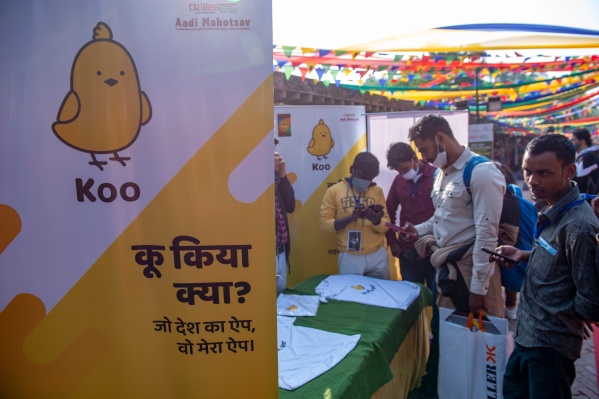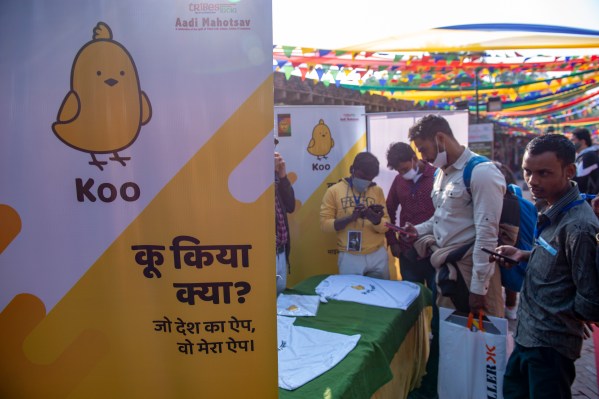Entertainment
Twitter rival in India Koo will let users self-verify


Indian social media app Koo introduced a voluntary self-verification service to its users on Wednesday in an unusual step that it believes will bring credibility and trust on its platform.
The Bengaluru-headquartered startup said users on its platform will have the option to self-verify their profiles “in seconds” using their government-approved identity cards.
The feature is designed to improve the quality of discourse and curb bad elements such as spammers, bots and anonymous trolling, Koo co-founder and chief executive Aprameya Radhakrishna told TechCrunch in an interview.
A group of users tend to contribute negatively on social media platforms because there is no way people can hold them to account, Radhakrishna explained.
Users who verify themselves will get a green tick marker against their name when they comment on a post. “This will mentally give their input in a conversation more weightage,” he said, adding that posts and comments from verified users may rank better on the platform eventually.
On social media platforms, a verification badge is typically reserved for celebrities and other influential public figures, making it a coveted feature. Users will be able to verify themselves on Koo by linking their accounts to a unique biometric number from New Delhi’s digital identity database Aadhaar. They will receive a one-time password on their Aadhaar-registered phone number for authentication.
Radhakrishna said the startup will work with a third-party firm to verify users and won’t store users’ IDs. This will recuse the startup from being in a position to be able to share users’ personal data with law enforcement agencies, he said in response to a question.
The move is also positioning Koo — which operates in 10 Indian languages and has been downloaded over 30 million times — to become a more attractive platform among advertisers as they will have the option to reach only those users who have verified themselves.
No other social media platform anywhere in the world has taken a step of this kind, said the startup, which counts Tiger Global, Mirae Asset, Blume Ventures, Accel and 3one4 Capital among its backers.
“Users can get self-verified in less than 30 seconds through our safe and secure verification process. This is a huge step towards lending greater authenticity to users and promoting responsible behavior on the platform. Most social media only give this power to some accounts. Koo is the first platform that has now empowered every user to have the same privilege,” he said.
The announcement is part of a broader attempt from Koo to proactively address the challenges that have troubled established social media firms Twitter and Facebook. Later this week, Koo also plans to publish the inner workings of its algorithms, including how it ranks posts to help lawmakers gain better understanding of — and build more confidence in — the platform.
The platform, which has attracted a number of Indian politicians on the platform in the past one year, allows users to reach a wide number of users by cross-posting their thoughts in multiple languages.
Radhakrishna also said Koo is evaluating new ways including web3 to monetize on the platform.
-

 Entertainment6 days ago
Entertainment6 days agoWordPress.org’s login page demands you pledge loyalty to pineapple pizza
-

 Entertainment7 days ago
Entertainment7 days agoRules for blocking or going no contact after a breakup
-

 Entertainment6 days ago
Entertainment6 days ago‘Mufasa: The Lion King’ review: Can Barry Jenkins break the Disney machine?
-

 Entertainment5 days ago
Entertainment5 days agoOpenAI’s plan to make ChatGPT the ‘everything app’ has never been more clear
-

 Entertainment4 days ago
Entertainment4 days ago‘The Last Showgirl’ review: Pamela Anderson leads a shattering ensemble as an aging burlesque entertainer
-

 Entertainment5 days ago
Entertainment5 days agoHow to watch NFL Christmas Gameday and Beyoncé halftime
-

 Entertainment3 days ago
Entertainment3 days ago‘The Room Next Door’ review: Tilda Swinton and Julianne Moore are magnificent
-

 Entertainment4 days ago
Entertainment4 days agoPolyamorous influencer breakups: What happens when hypervisible relationships end





















